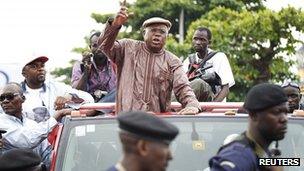Violence mars DR Congo election build-up
- Published

The final day of election campaigning in the Democratic Republic of Congo has been marred by violence in Kinshasa.
The clashes prompted police to ban final rallies, due ahead of Monday's parliamentary and presidential vote.
Police later moved in to end a stand-off with supporters of the main opposition candidate, Etienne Tshisekedi in the capital.
The UN Secretary General Ban Ki-moon said the government had "primary responsibility" for maintaining peace.
"I call on all political leaders and the people of the Democratic Republic of the Congo to exercise restraint throughout the process to ensure that the elections are held in a peaceful and secure environment," he said.
Tear gas
President Joseph Kabila and his two main rivals had been due to hold rallies within several hundred metres of each other, at the capital's main stadium.
But Governor Andre Kimbuta said that "because of the escalating violence seen in Kinshasa, all public demonstrations and other political meetings are cancelled this Saturday".
The interior ministry confirmed that two people had died in earlier clashes on Saturday.
Later, Mr Tshisekedi, of the Union for Democracy and Social Progress (UDPS), attempted to defy the ban as he flew into Kinshasa.
Throngs of his supporters, many brandishing palm fronds, had gathered along the airport road to greet the 78-year-old.
But his car was blocked by police who parked a large armoured truck across the road, hemming him in for eight hours.
The standoff ended only when police pushed members of his 20-car entourage into their cars with shoves and baton blows and forced the motorcade to drive off, AFP reports.
Police fired tear gas into the crowd to disperse them, AP reports. A number of UDPS officials were reported to have been roughed up or arrested.
Mr Tshisekedi was eventually escorted to his home by police.
'Escalating violence'
The elections on Monday see 11 candidates running for president and more than 18,000 candidates for the 500-seat parliament.
It will be the second presidential poll since the 1998-2003 war.
However, there are concerns over the distribution of ballot papers, as some planes bound for the country's regions have been unable to take off because of bad weather.
Mr Tshisekedi has also alleged that the head of the national election commission favoured Mr Kabila, and that "ghost" polling stations would be used to rig the result.
Election experts say it is unlikely the ballots will be able to reach the remote interior of a country where some 60,000 polling stations are spread out over a territory the size of Western Europe.
"The end result of a democratic election should be the resolution of conflict. Instead, we're heading into an election which is by its very nature bound to aggravate conflict," said Jerome Bonso, co-ordinator of the Coalition for Peaceful and Transparent Elections.
The last election, in 2006, was marred by weeks of street battles led by supporters of the losing candidate.
The BBC's correspondent in Kinshasa, Will Ross, said whether it is peaceful or not this time will depend to a great extent on the behaviour of the candidates and whether the losers are willing to accept defeat.





